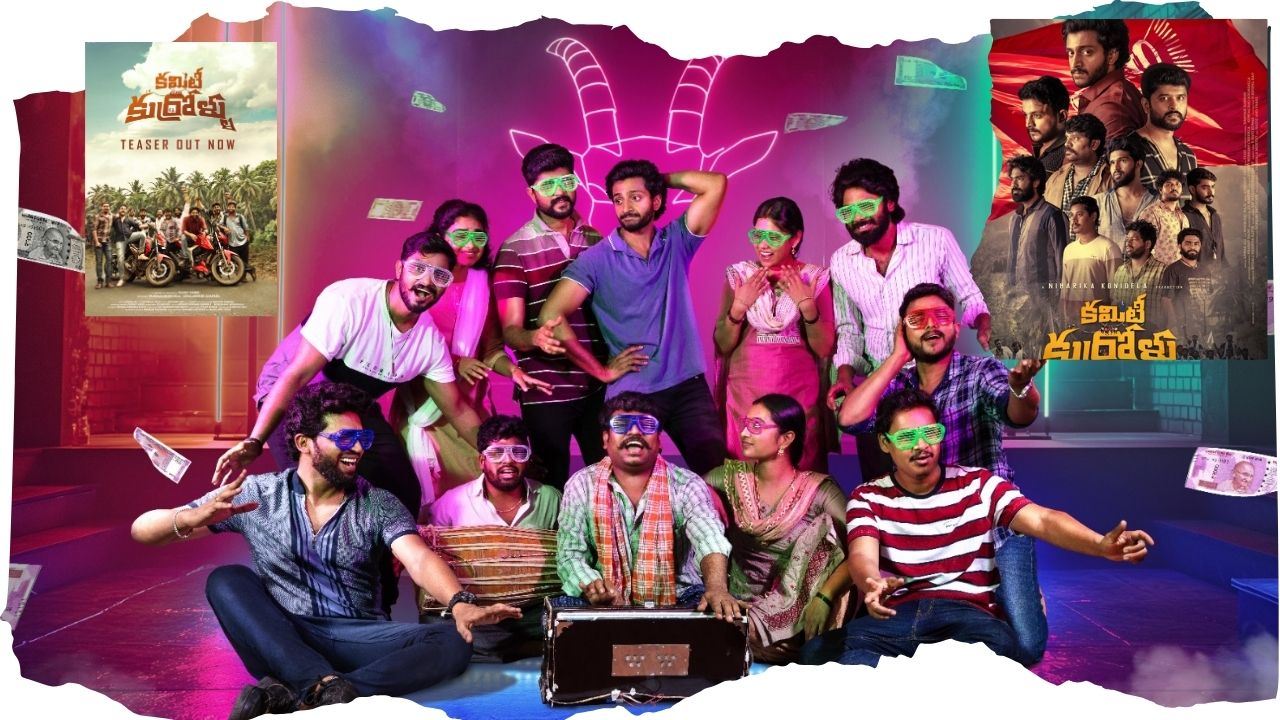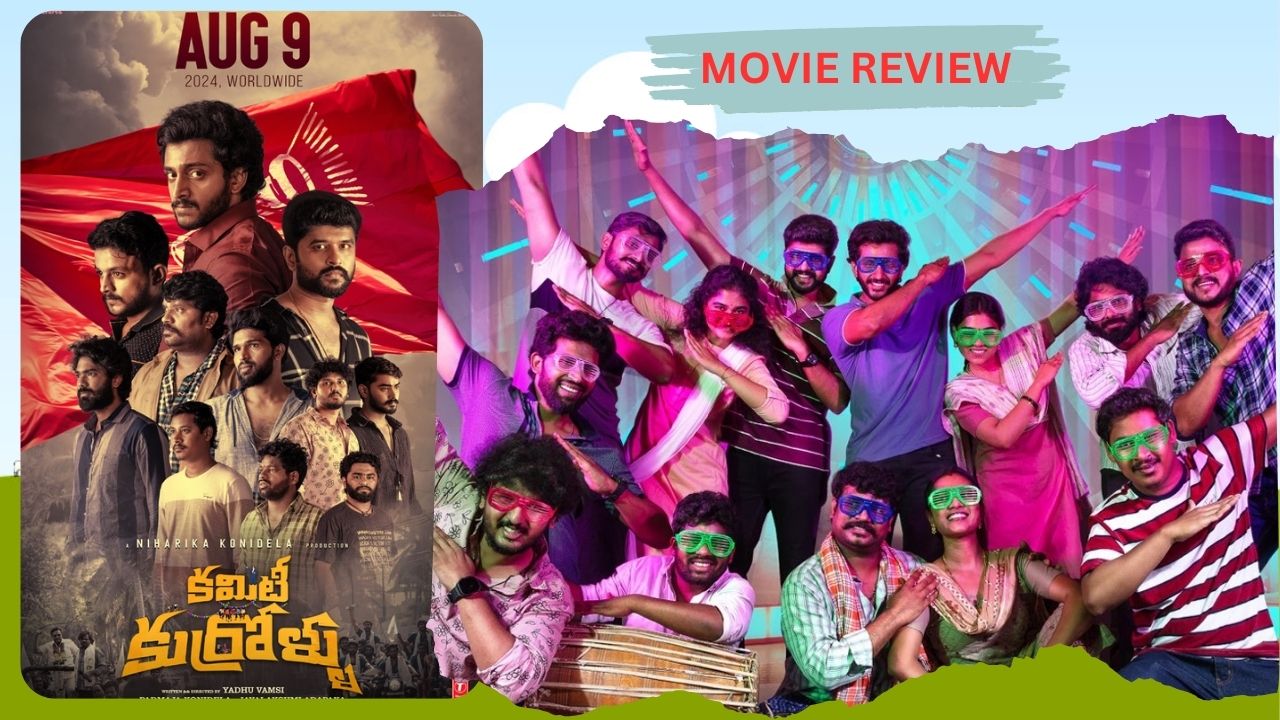Committee Kurrollu Review: A Nostalgic Journey with Mixed Emotions
Committee Kurrollu, directed by Yadhu Vamsi, is a coming-of-age drama that delves into the world of friendship and village life, aiming to strike a chord with viewers through its nostalgic elements. The film, set against the backdrop of the Godavari region, portrays the trials and tribulations of youth while trying to capture the essence of enduring friendships. Although it successfully evokes a sense of nostalgia and offers heartfelt moments, it struggles with pacing and character depth, which affects its overall impact.
What Worked
Nostalgia Factor: The film excels in its depiction of village life, transporting the audience back to simpler times filled with youthful exuberance and camaraderie. The nostalgic elements are well-crafted, creating an authentic portrayal of village traditions and the carefree days of youth. This aspect of the film resonates with many viewers who cherish memories of similar experiences.
Performances: A standout feature of Committee Kurrollu is its ensemble cast, predominantly made up of newcomers. Their performances are earnest and genuine, adding a layer of authenticity to the characters. The actors bring a refreshing vibrancy to their roles, which is commendable given their relative inexperience. Their portrayal of friendship and personal growth adds depth to the film, making the characters relatable.
Trinath Varma stands out as his character experiences a range of emotions. From evil to good, his transformation is well written and Trinath did 100% justice to his role. Prasad Behra is a pleasurable addition to the movie, he brought the same old unique grace. All the girls who played the male leads’ love interests did fantastic jobs. Their presence is more relatable.
Cinematography: The film’s cinematography is visually appealing, with the portrayal of the Godavari region being a highlight. The lush landscapes, vibrant festivals, and traditional settings are captured beautifully, enhancing the overall viewing experience. The camera work effectively complements the narrative, immersing the audience in the rural setting and adding to the film’s nostalgic charm.
Music: Anudeep Dev’s background score is a notable asset, enhancing the film’s emotional moments with its evocative melodies. While the songs may not become chartbusters, they fit seamlessly within the narrative, enriching the storytelling and underscoring key scenes. The music contributes to the film’s emotional resonance, helping to draw viewers into the story.
Critique
Uneven Pace: Although Committee Kurrollu starts with a strong and engaging premise, it struggles with pacing issues as the story progresses. The second half of the film loses momentum, becoming predictable and overly sentimental. The narrative drags, and the initial excitement gives way to a slower, less compelling story, which diminishes the overall impact.
Character Development: One of the film’s significant shortcomings is its underdeveloped characters. While the initial introduction of the characters is engaging, their development throughout the film feels inadequate. The arcs of many characters lack depth and complexity, resulting in a lack of emotional connection.
Themes and Symbolism
Committee Kurrollu weaves several themes throughout its narrative, with the central focus being on friendship and the impact of time on relationships. The recurring village festival serves as a powerful symbol of continuity and change, highlighting the cyclical nature of life and the enduring bonds formed in youth. This theme resonates well, providing a sense of authenticity and relatability. However, the film’s execution of these themes feels inconsistent, with moments of poignancy often overshadowed by the narrative’s pacing issues.

The portrayal of village life is both nostalgic and vivid, offering a glimpse into traditions and customs that are integral to the setting. While this adds depth to the film, it also occasionally distracts from the main storyline. The film’s attempt to blend these cultural elements with its coming-of-age narrative is admirable but unevenly integrated, sometimes leading to a disjointed viewing experience.
Directorial Approach
Director Yadhu Vamsi’s approach in Committee Kurrollu shows a clear vision of capturing the essence of rural life and the significance of lifelong friendships. His attention to detail in depicting the village festival and the authentic portrayal of character interactions are commendable. However, the film’s execution of these elements is hampered by pacing issues and a lack of depth in character arcs.
Vamsi’s decision to work with an all-new cast adds freshness to the film, but it also brings challenges in terms of experience and chemistry. While the performances are genuine, the lack of seasoned actors may contribute to the unevenness in the film’s emotional delivery. The direction occasionally struggles to balance the nostalgic elements with the narrative’s progression, leading to a film that feels disjointed at times.
Overall Impact
Committee Kurrollu is a film that offers a heartfelt exploration of friendship and nostalgia but struggles to maintain its momentum throughout. The film succeeds in creating moments of warmth and humor, particularly through its depiction of village life and the camaraderie among friends. However, its uneven pacing, underdeveloped characters, and a rushed climax detract from its overall impact.
For viewers who appreciate coming-of-age stories and are willing to overlook some of its shortcomings, Committee Kurrollu provides a nostalgic journey that evokes a sense of familiarity. The film’s strengths lie in its performances, cinematography, and music, which contribute to its charm. Nevertheless, the narrative’s uneven execution and lack of emotional depth limit its effectiveness as a complete cinematic experience.
Verdict
Committee Kurrollu is a modest attempt at capturing the essence of friendship and nostalgia. While it offers some engaging moments and a glimpse into village life, it falls short of delivering a fully cohesive and impactful story. The film is best suited for those who enjoy nostalgic dramas and are willing to appreciate its merits despite its flaws.
Sarkar Rating: 2.5/5
Read More: Alanati Ramachandrudu Review



